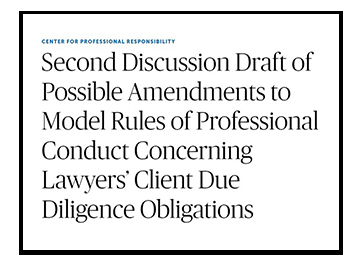PROFESSOR EMERITA TERRY COMMENTS ON THE ABA’S 2ND AML DUE DILIGENCE DISCUSSION DRAFT
 September 2022 — Professor Laurel S. Terry, who is the H. Laddie Montague Jr. Chair in Law and Professor of Law Emerita, recently provided a second set of oral and written comments to the American Bar Association regarding its efforts to develop a client due diligence ethics rule. Her comments addressed the June 28, 2022 Second Discussion Draft that proposed adding new language to Rule 1.2(d) of the ABA Model Rules of Professional Conduct.
September 2022 — Professor Laurel S. Terry, who is the H. Laddie Montague Jr. Chair in Law and Professor of Law Emerita, recently provided a second set of oral and written comments to the American Bar Association regarding its efforts to develop a client due diligence ethics rule. Her comments addressed the June 28, 2022 Second Discussion Draft that proposed adding new language to Rule 1.2(d) of the ABA Model Rules of Professional Conduct.
Professor Terry’s written submission and oral comments noted that whatever the ABA did with respect to Rule 1.2(d), it was imperative that it add language to Rule 1.1 that explicitly stated that lawyers had a duty of competence, and thus a duty of inquiry, with respect to the exercise of their professional obligations. Professor Terry explained why the “if-then” structure and conditional nature of the Second Discussion Draft was insufficient. She explained that due diligence must not be conditional and that the obligation that speakers said was implicit in the ABA Model Rules of Professional Conduct should be made explicit.
Professor Terry’s prior comments on the First Discussion Draft are available here and her remarks at the first Zoom Roundtable are available at this link). An ABA news story about the cited Professor Terry’s comments, among others. The ABA posts the comments it receives at this link.
Professor Terry’s written and oral remarks to the ABA drew upon expertise she developed as a result of her scholarship and service. Links to her AML scholarship and her AML-related service, including her service on the ABA Task Force on Gatekeeper Regulation and the Legal Profession, were previously documented here.
Professor Emerita Laurel S. Terry, who held the inaugural H. Laddie Montague, Jr. Chair in Law and was Dickinson Law’s inaugural Associate Dean for Research and New Faculty Development, is a three-time Fulbright recipient who writes and speaks about the impact of globalization on the legal profession, especially with respect to regulatory issues. Her scholarship has identified emerging issues for the legal profession and urged stakeholder engagement, new initiatives, and regulatory reform. In addition to speaking at academic and professional conferences, she has been invited to speak about her scholarship to organizations that include the Conference of Chief Justices, the National Conference of Bar Examiners, the National Organization of Bar Counsel, the National Conference of Bar Presidents, the CCBE, which represents EU’s legal profession and legal regulators, the Federation of Law Societies of Canada, the International Institute of Law Association Chief Executives, the International Bar Association, and the International Conference of Legal Regulators.